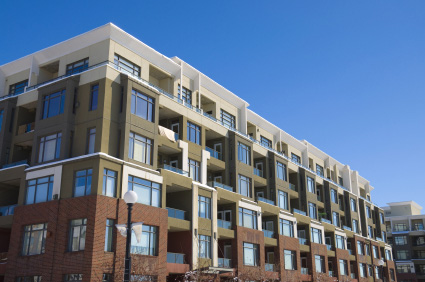Do you have the right insurance for your condo?
Emmet Pierce
Insuring your condo is different from insuring a detached house. Before you choose a condo insurance policy, review your condo association’s bylaws to determine exactly what parts of your home are your responsibility to insure.
Condo insurance disputes may arise when condominium owners don’t understand the limits of their homeowner policies, says Michael Barry, a spokesman for the trade group Insurance Information Institute.
“You want to make sure you know where your insurance responsibilities begin and end,” he stresses.”It’s usually laid out in your condo association bylaws, which is something most people don’t read.”
Looking for affordable home insurance? Shop the best home insurance quotes here.
Association bylaws cover the rights and responsibilities of condominium owners. For example, they typically will explain how “common areas” such as laundry rooms, lobbies, and swimming pools, must be insured by the condo association, using a portion of the monthly dues that are collected from all residents.
Here are the differences between a master policy and a condo insurance policy.
What special insurance needs do condos have?
The insurance coverage maintained by your condo association is called a “master policy.” In some cases, the association is responsible for insuring only the bare walls, floors and ceilings of individual units, says New Jersey insurance agent Kevin Foley. That means owners are on the hook for insuring everything inside their homes, including kitchen cabinets, interior partitions, plumbing, carpeting and bathroom fixtures.
In other cases, the association is responsible for insuring the unit and its fixtures as it was built, he adds. If you make any alterations to the original structure, such as kitchen or bathroom remodels, the improvements must be covered by your own insurance policy.
According to Pete Moraga, a spokesman for the Insurance Information Network of California, condo associations typically are required to maintain and insure the complex’s structure and all “common areas.”
Master policy premiums are paid from the dues that all condo association members pay. If your association’s master policy is inadequate and your complex suffers a major loss, such as damage from a storm, individual homeowners may have to pay a share of the cost of repairs.
For example, if repair costs exceeded the association’s master insurance policy limit by $100,000 and there were 20 condo units, the owners of each unit typically would have to pay $5,000.
Here are the differences between a master policy and a personal condo insurance policy.
Master Policies
What’s covered? Common areas that are jointly owned by members of condo associations, including roofs, lobbies, exterior walls, and playgrounds.
How are they paid? The moneytypically is taken out of condo association dues, which generally are billed monthly.
What isn’t covered? Yourpersonal possessions, such as furniture, electronics, jewelry, artwork and collectibles. Your condo association’s master policy won’t cover your personal losses from burglaries, fires, or natural disasters. It also doesn’t provide protection for personal liability claims that arise from damage caused by you or members of your household.
Personal Condo Policies
What’s covered? Everything inside your unit that is not covered by your condo association’s master policy, such as personal possessions. It may also cover property from the exterior framing inward, including interior walls, ceilings and floors. You can also get bathroom and kitchen fixtures covered if they aren’t covered by the master policy. This policy also covers any remodeling improvements you make to your unit. Most policies protect you from damage that results from fire or lightning, windstorms, smoke, theft, water damage, and vandalism. This policy includes personal liability protection. It also will pay for any living expenses you incur if you are forced to temporarily relocate while the unit is repaired.
How is it paid? You will be billed directly by your insurance company.
What isn’t covered? Common areas that typically are covered by your condo association’s master policy, including building exteriors, laundry rooms, roofs, and lobbies. Most policies also won’t cover flood damage.
How much does a condo insurance policy cost?
Several factors go into setting premiums for condo policies. The age of the unit, the materials that were used in construction, and the location will be taken into consideration by insurance underwriters.
Foley says premiums generally are highest in major metropolitan areas, where the costs of repairing and replacing property damage are more expensive. Policies in small towns and rural areas are generally less expensive.
He adds that a condo policy that covers $25,000 worth of contents, $25,000 in home improvements and $500,000 in liability insurance typically would cost between $500 and $700 per year, depending on location.
Foley says there are several coverages you should consider adding to a basic condo policy.
- Umbrella liability coverage adds protection for damage you or members of your household may cause to others. You typically can add $1 million in liability coverage for between $125 and $150 per year, he says.
- Water backup insurance will cover your damage if sewers or drains back up. Check to see if this is included in your basic condo owner’s policy. If it is not, Foley says you typically can add it for about $25 per year. Your personal condo policy typically will cover the damage from another condo’s pipes bursting and leaking water into your unit.
- Coverage for special assessments will reimburse you for your share of any common area repair costs that exceed your condo association’s master policy.
Flood and earthquake coverage typically are purchased separately from standard condo policies. You can view earthquake hazard maps at the U.S. Geological Survey’s website to gauge your seismic risks. The danger of flooding can be determined by visiting the Federal Emergency Management Agency’s FloodSmart.gov.
See how much you could save today on your home insurance. Get your free home insurance quotes today!
